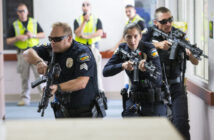The other night a call went out over the radio about a 12-year-old who was locked in a bathroom with a knife to his throat. I heard this and gathered my paperwork. As one of my department’s negotiators, I also responded to the call.
While I was en route, dispatch advised that the kid was on the balcony and possibly going to jump. The call was updated again about him leaving the knife behind and running away.
Two other officers arrived first to handle the call. When I got there I stood by and watched them talking with the kid’s sisters and grandmother. They asked the “who, what, where and why” questions, which were standard.
When there was a break in the conversation I asked the handling officer, “Do you mind if I ask some questions?”
I took my notepad out as I stepped forward. I didn’t ask the sister what her brother was wearing or his height or weight. I looked at the girl and said, “What does he like to do?”
I wanted to know more about him as a person in case I needed to talk him off a bridge. I wanted to know his likes and dislikes. I wanted to know what he did for fun and what he liked to talk about. I wanted to know about his parents and who he got along with. I also wanted to know about their living situation.
I took notes while she told me about her brother. After a few minutes, I felt like I had enough to talk about with him if the opportunity came up. I turned toward the other cop and said I was done. I stepped aside and he continued.
A minute later the sergeant said, “He’s back.”
Well, at least he wasn’t on a bridge with a knife in his hand. I walked outside and went down the stairs to where the kid was. He was sitting on the stairs with his head down.
The officer, who was in his mid-20s, knelt down and asked, “What’s wrong?” The kid just sat there and didn’t move. The cop asked the kid numerous times, but it was as if he wasn’t there. The young cop even said, “We want to help.” The kid just kept his head buried in his hands.
The second cop came down the stairs and looked at the first officer. The first said, “He’s not talking.”
Numerous times, the second cop asked the kid what was wrong and what happened. Each question was met with silence. Both cops looked at each other and shrugged their shoulders.
I asked, “Do you mind if I try?”
I walked over to the kid and turned to sit down on the steps next to him as I said, “Move over.” He had to move over because I was sitting down whether he was there or not. I took my seat and looked over at him.
He was about the same size as my daughter, who was the same age. I couldn’t help but compare the two. I wondered what was going on inside his head and what brought him to this point.
Earlier, this kid had a knife to his throat at about the same time my daughter was having fun at gymnastics practice. Her biggest worry was her 4.0 GPA and a four-hour gymnastics workout. This kid had much bigger problems.
His head was still in his hands when I said, “So, tell me about Clash Royale.” That was the game his sister told me about.
He raised his head and smiled. It was like I flicked the light switch on.
“Ah, you smiled,” I said. This made him smile some more. “Tell me about the game. I don’t know what it is.”
That’s when he spoke.
After he was done talking about the game I said, “I hear you like to draw the characters from the game.”
“Yeah.”
“Which ones?”
After he was done, I pulled out my phone and asked him if he wanted to see a video of my son being mad and trying not to smile. He nodded his head and I hit play. I said: “I call him a man-child. He thinks he’s a man, but he’s still a kid.”
The boy laughed as he wiped away tears from his face. I had him now.
I next asked him about the Golden State Warriors and his favorite player. He talked about that also and I was thankful he didn’t ask me any questions because I’m not a basketball fan.
Now that the ice was broken I asked, “Did you put the knife to your throat?”
“Yeah.”
I next asked him why he was mad today. He told me his sisters were bothering him.
“My sister and I used to bug each other too, but we’re friends now,” I said, trying to sound encouraging.
After a few more minutes of talking, I pointed to the other cops and said: “I think they feel bad you talked with me and not them. Can you talk to them now?”
The boy nodded his head.
It was now time for me to go. I shook his little hand and said bye to him. I walked up to the other officers and told them what he said about the knife. They took over from there.
Feeling proud to be a negotiator, I walked through the rundown apartment complex and out to the street toward my car. I felt like I had made a difference today. I might not have talked him off a bridge or a rooftop, but at least I got through to him in his time of need.
That was a win today.
Read more from John Roman at badge415.wordpress.com
 Behind the Badge
Behind the Badge



